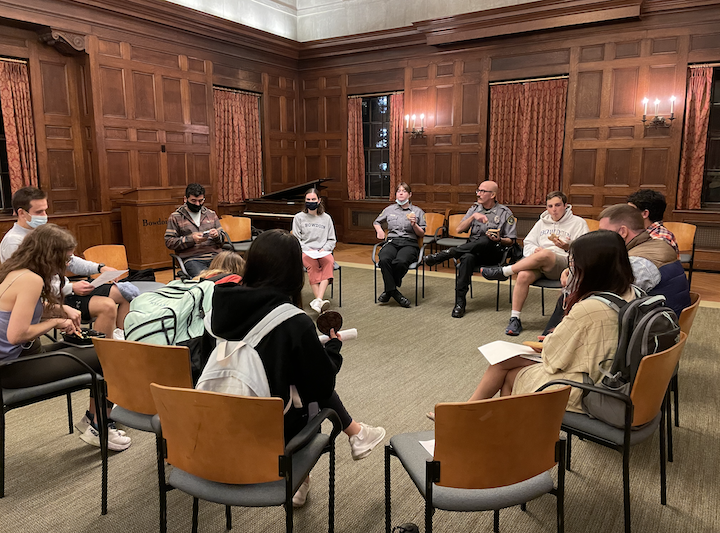PNVCR hosts community circle on anonymous speech on social media
October 15, 2021
 Courtesy of Peyton Tran
Courtesy of Peyton TranThe Program for Nonviolence and Conflict Resolution (PNVCR) held its first event, a community circle on anonymous speech and social media, on October 1. The event was an opportunity for faculty, staff and students to discuss the role of anonymous online speech in the Bowdoin community.
The PNVCR, which launched at the beginning of this semester, serves as an additional pathway for community members to address harm and conflict outside of traditional conduct review processes. The program has been a collaboration between the Office of the Dean of Students and Residential Life (ResLife).
In addition to holding open discussions, like the social media community circle, the PNVCR will offer a range of services to acknowledge harm and facilitate conflict resolution. Community members who are encountering harm or interpersonal conflict can submit a request for services on the PNVCR’s website. Additionally, the Office of the Dean of Students may refer students to the program for a restorative justice process after a conduct violation.
Director of Residential Education and Associate Director of Student Life Whitney Hogan, one of the program’s directors, emphasized that the PNVCR aims to be proactive as well as reactive.
“Community circles are a facilitation technique that is non-hierarchical, anti-colonialist, anti-patriarchal and is a way to really get people to be architects in designing the community that they are in,” Hogan said.
Besides its four directors, the program has eight student facilitators who have been trained in nonviolent conflict resolution and restorative justice techniques. These students work with the directors and faculty and staff facilitators to lead community circles and conflict mediations.
Peyton Tran ’23, a student facilitator and a member of the Conduct Review Board, said that the program fills a gap in the College’s response to conflict.
“There might be tension where there’s not a dean-level conduct violation, and there’s nothing that needs to go to ResLife necessarily,” Tran said. “I think that part of what this program can do is bring everybody together, facilitate a dialogue about it, come to a conclusion and clear the air.”
The facilitators have identified anonymous online speech as an issue that might benefit from further discussion through the PNVCR. The group recognized that students were using YikYak and anonymous Instagram accounts to voice grievances in ways that might be empowering but also had the potential to create harm.
“If you’ve been on YikYak you know, yeah, there’s funny posts about people stealing squirrels that are harmless, but also I think a lot of it is trying to find a common enemy,” Colby Santana ’23, one of the student facilitators, said. “A lot of people have lost that [sense of community] and finding that is very easy, establishing an ‘us versus them’ mindset.”
Tran noted that this kind of programming is particularly important after the loss of multiple in-person semesters.
“A major part of what we hope the PNVCR will do is repair harm to the community, but I also think it can be a powerful tool to help rebuild the community that the upperclassmen have seen before the pandemic. Probably not the same community, but regardless, I feel like we have an opportunity here to start to bring people back together with a sense of shared values,” Tran wrote in an email to the Orient.
Associate Dean of Student Affairs and Community Standards Katherine O’Grady has been working toward establishing more restorative justice practices since she came to the College five years ago. Now, she is one of the directors of PNVCR and sees more enthusiasm for these ideas from all parts of the College.
“We have gone from this kind of alien concept for people that like, ‘Oh, you want me to sit down and talk about my feelings? Mmm I’m good, thanks, I’ll just take the punishment.’” O’Grady said. “We’ve gone from that to introducing this in a way that people are really excited about [it], faculty being like, ‘Um, can we get some training on this?’”
While the PNVR program may have just hosted its first event, the shift to new and improved conflict-resolution resources has been a long time coming. From here, integration into campus life is key.
“A lot of it’s just establishing ourselves now, and the goal is to become a larger group, a group that’s very well trained and something that permeates throughout campus so that students know what to do with conflict, when things get tough,” Santana said. “Because [it’s] college, I mean, everything gets tough.”

Comments
Before submitting a comment, please review our comment policy. Some key points from the policy: